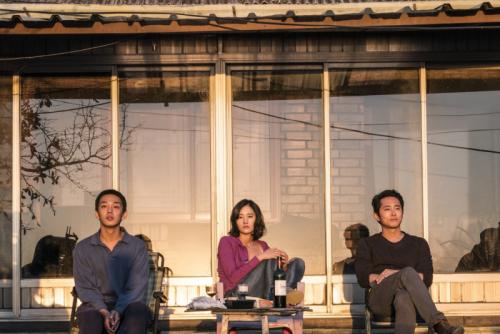Reviews - Burning
Burning
Reviewed By Stephen Pye

Burning
Constructive ambiguity is the watchword for Lee Changdong's exceptional new film, his first since 'Poetry' (2010). It's notionally based on Murakami Haruki's story 'Barn Burning', but Lee has done much more than transpose the setting from Japan to Korea. They've turned the story's first-person narrator into a very un-Murakami-like protagonist: a young man from a broken, working-class home whose father has anger-management issues which have landed him in police custody.
Then they've made the young woman who fascinates him someone of the same age from the same rural area – and given them a one-night stand to sharpen the boy's jealousy when she goes off with a rich, sophisticated guy who's a few years older. And they've introduced a cat (Murakami loves cats, but there wasn't one in this story) and made the possibility that a murder has occurred off-screen much more concrete. Not least, they acknowledge (and complicate) Murakami's debt to the earlier story of the same title by William Faulkner. As adaptations go, this one is exceptionally smart. The protagonist is Jongsu, a twenty-something creative writing graduate who'd like to be a novelist but hasn't yet fixed on anything to write about. In one sense, what catches fire here is Jongsu's imagination: his discovery – ruinous, as it turns out – of people, ideas and drugs which get his mind racing in the way he's always wanted, and inspire him to walk away from the casual labouring jobs that have kept him going.
The people are Haemi, a questioning young woman who does casual jobs in the same way as Jongsu while going to classes in mime and finding inspiration from the bushmen of the Kalahari, and Ben, an enigmatic, almost Gatsby-like figure who steals Haemi from Jongsu and admits to feeling jealous for the first time in his life when Haemi told him that Jongsu meant most to her. It's Ben who provides the drug (marijuana, highly illegal and almost unobtainable in Korea, as in Murakami's Japan) and delivers the film's key metaphor when he claims that his hobby is arson: setting fire to derelict greenhouses which are "just waiting for me to burn them". Jongsu, deeply uncomfortable in Ben's presence and gripped by class resentment, comes to suspect that Haemi herself is the 'greenhouse' which Ben has decided to 'burn'.
Ben lives in a sterile and supremely ordered apartment, in contrast with the cluttered chaos in Haemi's bedsit and Jongsu's farmhouse, and his claim that he eliminates "useless, filthy, unpleasant-looking" structures has a clear metaphorical resonance. When Jongsu is driven to attack Ben, he's following a family trait. His father, who owns the farmhouse, is banged up on assault charges. It's Jongsu who starts the film's only actual fire, using Ben's Zippo lighter – which suggests how deeply the metaphor has stuck in the mind of an aspiring novelist. Lee has seeded this development with a tiny fantasy sequence: Jongsu imagines himself as a naked little boy in front of a burning greenhouse.
Unless you count the loudhailer propaganda broadcasts from North Korea distantly audible from the farmhouse (it's near Paju, very close to the border), there are no politics in Burning. Burning is primarily about the novelistic imagination. Where truth lies or is to be found in any narrative, even the narrative of our own life, is what this film is really seeking to demonstrate. As such it is deliberately vague, at times inchoate, and deliberately ambiguous.
Jongsu doesn't really understand Haemi's interest in the 'Great Hunger', the Kalahari bushmen's quest for meaning in life, but the way his resentment of Ben's privilege and confidence evolves into paranoia and rage, resulting in the films extraordinary denouement, matches a global, visceral anger, especially amongst the young.
Then they've made the young woman who fascinates him someone of the same age from the same rural area – and given them a one-night stand to sharpen the boy's jealousy when she goes off with a rich, sophisticated guy who's a few years older. And they've introduced a cat (Murakami loves cats, but there wasn't one in this story) and made the possibility that a murder has occurred off-screen much more concrete. Not least, they acknowledge (and complicate) Murakami's debt to the earlier story of the same title by William Faulkner. As adaptations go, this one is exceptionally smart. The protagonist is Jongsu, a twenty-something creative writing graduate who'd like to be a novelist but hasn't yet fixed on anything to write about. In one sense, what catches fire here is Jongsu's imagination: his discovery – ruinous, as it turns out – of people, ideas and drugs which get his mind racing in the way he's always wanted, and inspire him to walk away from the casual labouring jobs that have kept him going.
The people are Haemi, a questioning young woman who does casual jobs in the same way as Jongsu while going to classes in mime and finding inspiration from the bushmen of the Kalahari, and Ben, an enigmatic, almost Gatsby-like figure who steals Haemi from Jongsu and admits to feeling jealous for the first time in his life when Haemi told him that Jongsu meant most to her. It's Ben who provides the drug (marijuana, highly illegal and almost unobtainable in Korea, as in Murakami's Japan) and delivers the film's key metaphor when he claims that his hobby is arson: setting fire to derelict greenhouses which are "just waiting for me to burn them". Jongsu, deeply uncomfortable in Ben's presence and gripped by class resentment, comes to suspect that Haemi herself is the 'greenhouse' which Ben has decided to 'burn'.
Ben lives in a sterile and supremely ordered apartment, in contrast with the cluttered chaos in Haemi's bedsit and Jongsu's farmhouse, and his claim that he eliminates "useless, filthy, unpleasant-looking" structures has a clear metaphorical resonance. When Jongsu is driven to attack Ben, he's following a family trait. His father, who owns the farmhouse, is banged up on assault charges. It's Jongsu who starts the film's only actual fire, using Ben's Zippo lighter – which suggests how deeply the metaphor has stuck in the mind of an aspiring novelist. Lee has seeded this development with a tiny fantasy sequence: Jongsu imagines himself as a naked little boy in front of a burning greenhouse.
Unless you count the loudhailer propaganda broadcasts from North Korea distantly audible from the farmhouse (it's near Paju, very close to the border), there are no politics in Burning. Burning is primarily about the novelistic imagination. Where truth lies or is to be found in any narrative, even the narrative of our own life, is what this film is really seeking to demonstrate. As such it is deliberately vague, at times inchoate, and deliberately ambiguous.
Jongsu doesn't really understand Haemi's interest in the 'Great Hunger', the Kalahari bushmen's quest for meaning in life, but the way his resentment of Ben's privilege and confidence evolves into paranoia and rage, resulting in the films extraordinary denouement, matches a global, visceral anger, especially amongst the young.
Find A Film
Search over 1500 films in the Keswick Film Club archive.
Friends
KFC is friends with Caldbeck Area Film Society and Brampton Film Club and members share benefits across all organisations
Awards
Keswick Film Club won the Best New Film Society at the British Federation Of Film Societies awards in 2000.
Since then, the club has won Film Society Of The Year and awards for Best Programme four times and Best Website twice.
We have also received numerous Distinctions and Commendations in categories including marketing, programming and website.
 Talking Pictures
The KFC Newsletter
Talking Pictures
The KFC Newsletter
Links Explore the internet with Keswick Film Club


